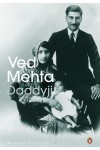
Daddyji
Daddyji is, at first glance, a biographical portrait of Amolak Ram Mehta, a distinguished Indian public-health officer, written by his son Ved Mehta, but in reality, as the story unfolds, it is seen to be a recreation, in crystalline detail, of a whole world—the everyday life of a legendary place and time. Seventy-five years ago, when Daddyji—as he was to be called by his children—was born, in a house consisting of a few windowless mud-and-plaster rooms, in the village of Burkhurdar, in the Punjab, mustard oil was poured down the drain of the house to ward off evil spirits, the village band paraded through the lanes, and alms were distributed to the poor. His horoscope was cast: he would grow up to ride on the backs of elephants and sail upon the sea. Not many villagers did. His great-great-grandfather’s travels had been limited to his going on foot as far as the next village. His great-grandfather had made a pilgrimage to Hardwar by bullock cart. His grandfather had been a passenger on the first railway train between Lahore and Saharan-pur.
His father had ridden in a motorcar. But Daddyji, just as had been predicted, not only rode on the backs of elephants (while making medical arrangements for a huge religious festival) but also crossed oceans on steamships. He grew up in a series of Punjab villages (his father was an itinerant patwari, a government official who kept tax records), moved to the city of Lahore (he had always heard that Lahore was “the educational center of the world”), there encountered running water for the first time and entered Government College, went on to study medicine there at the King Edward Medical College, sailed for London to take degrees in Public Health and Tropical Medicine, returned to India to do notable work in cholera and bubonic plague, later journeyed to America, Sardinia, and, again, England, to work in malaria and tuberculosis, and finally returned to India to succeed his father as head of the Mehta family and to join the Punjab Public Health Department. Along the way, he married, built a house in Lahore, flashed about the countryside on a motorcycle on medical errands, became a rationalist and an Anglophile, an ardent clubman and an irrepressible gambler, and raised a large, talented family of his own. The story ends with Ved’s falling ill, at the age of four, with cerebrospinal meningitis, with his being left totally blind, and with his being sent off to an American mission school in Bombay, to prepare him to study in America and to lead a normal life. Ved Mehta has written about his father with an eloquent mixture of objectivity and filial affection. He has written about India with pure magic.